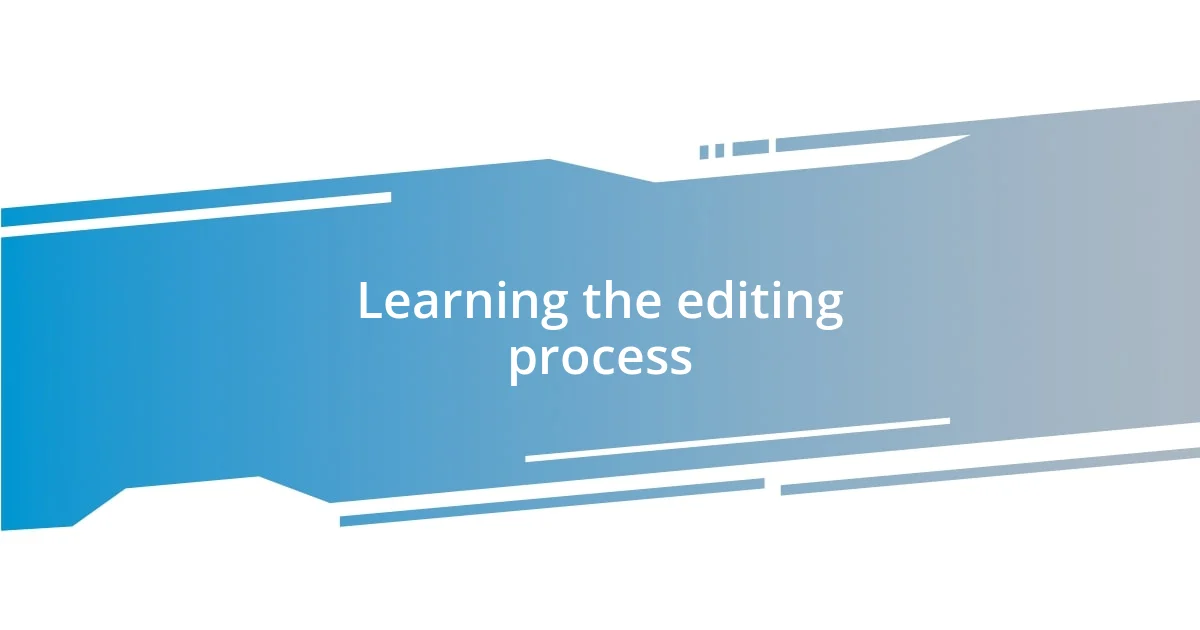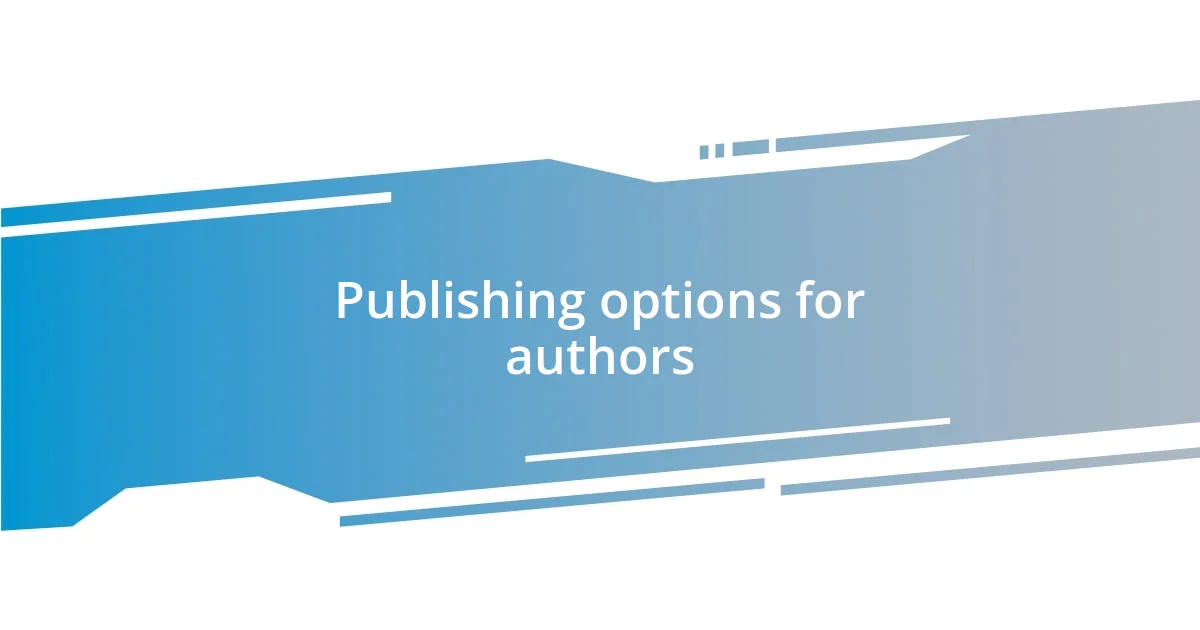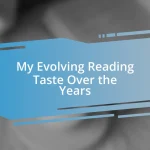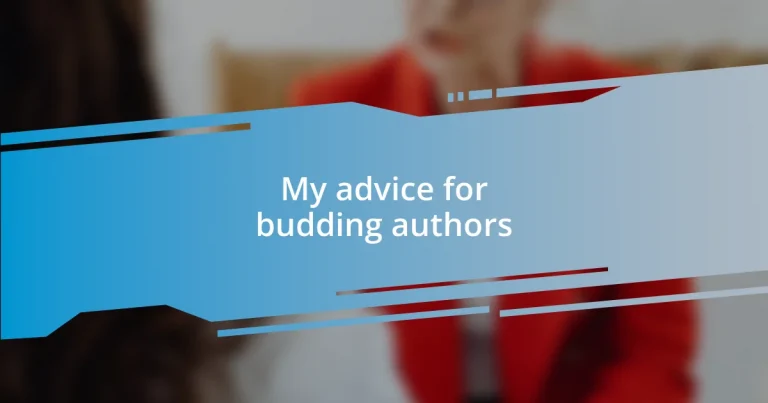Key takeaways:
- Defining writing goals guides your journey and keeps motivation high; evolving these goals fosters growth and connection with readers.
- Establishing a consistent writing routine enhances creativity, productivity, and accountability, transforming writing into a cherished habit.
- Building a support network through writing groups, retreats, and online platforms combats isolation and provides essential feedback and encouragement.

Understanding your writing goals
When I first started writing, I remember sitting at my desk, staring at a blank page, wondering what I truly wanted to achieve. Defining your writing goals is like setting the compass for your journey; it provides direction and clarity. Are you looking to express yourself, share a story, or perhaps influence others? Identifying this will shape your approach and keep you motivated.
One of my pivotal moments came when I realized I wanted to connect with readers on a personal level. It wasn’t just about putting words on a page; it was about creating relationships through storytelling. Have you thought about how you want your work to resonate with your audience? Understanding this can turn your writing from a solitary task into a shared experience, enriching both your journey and that of your readers.
As I reflected on my goals, I found that they evolved over time. Initially, I wanted to be published, but that soon morphed into wanting to inspire others and spark discussions. Have your goals changed as you’ve grown as a writer? Embracing that evolution is essential; it keeps your passion alive and helps you grow deeper into your craft.

Developing a writing routine
Building a writing routine is essential for nurturing your creativity and discipline. I can still recall the feeling of chaos when I wrote sporadically. Once I created a daily schedule, I found clarity and productivity like never before. By setting specific times for writing, I conditioned my mind to focus, allowing my words to flow more freely.
Here are some key steps to consider when developing your writing routine:
- Set a specific time: Choose a consistent time each day that works for you—early mornings or quiet evenings can work wonders.
- Create a comfortable space: Designate a cozy spot for writing that’s free from distractions; make it your sanctuary for creativity.
- Establish goals for each session: Whether it’s word count or time spent writing, having clear goals keeps you accountable and motivated.
- Incorporate breaks: Short breaks can recharge your brain; I often use them to reflect on my progress and regain focus.
- Track your progress: Keeping a journal or a spreadsheet of your writing can help you visualize your growth and stay committed.
As I began to stick to this routine, I noticed my ideas formed more cohesively. It was like unlocking a treasure chest in my mind. Writing became a cherished habit rather than a chore, and I eagerly looked forward to those moments of creation.

Finding your unique voice
Finding your unique voice is a journey that many writers, including myself, must embark upon. I clearly remember the struggle of imitating popular styles, thinking that would lead to success. It wasn’t until I allowed myself the freedom to write authentically that I found my rhythm. Are you ready to explore what makes your perspective distinctive? Tapping into your experiences and emotions will set you apart from the crowd.
In one instance, I decided to write about a mundane event—a trip to the grocery store. While at first glance, it seemed uninteresting, I infused it with my personal anecdotes and quirky observations. Suddenly, what was regular transformed into something relatable and amusing. I realized it’s often the seemingly trivial details that resonate deeply with readers, creating connection and authenticity. That moment of epiphany taught me that vulnerability can be a powerful tool in expressing my unique voice.
Embracing your own narrative style, complete with its imperfections, can feel daunting, yet it’s crucial. I recall receiving feedback on my drafts; some noted my unconventional sentence structures and oddball metaphors. Initially, I felt disheartened; however, that very feedback led me to further develop my distinctive voice. It was a reminder that your individual perspective is what makes your writing special. Have you dared to embrace your quirks in writing? Finding your voice is not about crafting perfection but celebrating who you are as a writer.
| Element | Imitation | Authenticity |
|---|---|---|
| Creativity | Limited by models | Boundless expression |
| Connection | Surface-level | Deep and resonant |
| Feedback | Stifles growth | Facilitates development |

Learning the editing process
Learning to edit is a transformative experience that every budding author must embrace. I remember my early days when I dreaded the thought of revisiting my drafts. It felt like tearing apart a beloved creation, but I soon realized editing is where the magic happens. Each time I revisited my work, I discovered opportunities to enhance clarity, tighten my prose, and polish my voice, leading to a final product I was truly proud of.
As I honed my editing skills, I adopted a strategy that worked wonders for me: stepping away from my work for a short time before revising. This little break allowed me to return with fresh eyes, making it easier to spot awkward phrases or inconsistencies. I often ask myself, “Are my ideas flowing logically?” If they’re not, I dive back in. This approach not only helped me catch errors but also sparked new ideas for enhancing the storyline or layering in depth—a crucial step in creating engaging content.
I also found that seeking feedback from trusted peers can be invaluable. The first time I shared my draft with a group, I was nervous—what if they didn’t like it? But their constructive critiques guided me on where to focus my edits. As they pointed out areas that needed clarification and those that shone, I learned to appreciate the diverse perspectives they offered. Have you thought about how outside feedback can enlighten your editing process? This collaboration can unveil blind spots and push your writing to new heights.

Building a support network
Building a support network is essential for any budding author. I remember the first time I joined a local writing group; I was both excited and terrified. Surrounded by people who understood the challenges I faced, I found a community that encouraged me to share my work and provided invaluable feedback. Have you considered how the right group can not only critique but also celebrate your milestones?
One of the most significant breakthroughs in my writing journey came from attending a writing retreat. Not only did I bond with fellow authors over late-night writing sessions, but we also formed friendships that extend beyond our writing lives. Through shared experiences and encouragement, these connections became a vital source of motivation during the inevitable times of self-doubt. How often do you engage with other writers to motivate one another?
Additionally, I discovered that social media can play a pivotal role in building a support network. Platforms like Twitter and Instagram allowed me to connect with other aspiring writers and industry professionals. By reaching out to others, whether for feedback or simply to share experiences, I felt less isolated in my journey. It’s amazing how a few encouraging words from someone who gets it can reignite your passion for writing. Have you explored online communities that resonate with your writing goals?

Publishing options for authors
Publishing options have evolved significantly, giving authors a world of choices. Traditional publishing, which was once the only route, offers the advantage of built-in distribution and professional support. Yet, I recall the months I spent submitting my manuscript, anxiously waiting for responses. The pressure can feel overwhelming, but understanding that rejection is part of the process helped me remain resilient. Have you ever considered how a rejection doesn’t define your work’s worth?
Then there’s self-publishing, which has been a game-changer for many. I took the plunge with my first book, and it was exhilarating to see it on platforms like Amazon. I learned the importance of taking charge of my marketing efforts and navigating the logistics of distribution myself. For anyone contemplating this path, I’d encourage you to weigh the creative control against the demands it places on your time. How comfortable are you with promoting your own work?
Hybrid publishing combines elements of both traditional and self-publishing, making it an appealing option. I stumbled upon hybrid publishers while researching alternatives, and it opened my eyes to a new way to retain more rights while still getting professional help. I often reflect on how this path could provide a balance between support and independence. If you’re looking for a blend of resources, this might just be the solution you need. Have you explored the hybrid model yet?

Promoting your work effectively
When it comes to promoting your work effectively, leveraging social media is a game changer. I remember the thrill of my first tweet about my book launch; the interactions and support I received from followers were uplifting. Have you ever noticed how sharing your creative process and milestones can build anticipation and foster a sense of community around your work?
A blog can be another fantastic platform for promotion. I started my own blog to share writing tips and personal stories, which not only helped me connect with readers but also allowed me to showcase my writing style. It’s incredible how writing about my journey attracted readers who became eager to learn more about my upcoming projects. Have you considered how a blog might serve as both a writing exercise and a promotional tool?
Don’t underestimate the power of local events and book signings. I found immense joy in meeting readers face-to-face at a small bookstore event. The conversations inspired me, and the feedback was immediate and refreshing. Plus, the connections made during these events often lead to word-of-mouth promotion that is invaluable. How often do you actively seek opportunities to share your story in your community?














